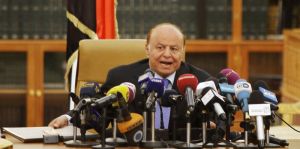
The situation is looking pretty queer, considering the fact that it’s been less that 48 hours since the conclusion of reconciliation talks in Yemen. All the parties involved in those talks agreed on the creation of a legislative mechanism that would ensure the peaceful transition of power. A new two-chamber body – the National Council that was to be created would have include the sitting Parliament and the new “transitional National Council” that was to be formed out of 250 representatives of the parties that are not represented in Yemen’s Parliament, with 30% of seats provided to women and additional 20% given to the youth. This decision was a difficult compromise between the Houthis that insisted on the establishment of a one-chamber National Council, and the General National Congress, led by former president Mansur Hadi, that insisted on the preservation of the existing Parliament. In addition, there was a high probability that the negotiations on the “presidential council” that had been proposed by the Houthis would have come to a successful completion before the upcoming briefing of the UN Security Council on Resolution 2201 that was due to start in early March.
But now all these plans may be put in jeopardy due to the fact that Mansur Hadi’s resignation hasn’t been approved by Yemen’s Parliament, there’s a danger that he may reclaim his authorities as the Yemeni president. In this situation he can name Aden or Taiz (country’s third largest city) a temporary capital on the pretext that Sana’a is captured by rebels. This was a part of the plan that the US and Saudi Arabia had devised before they organized his escape from Sana’a. In Yemen rumours are spreading rapidly, according to these Mansur Hadi can yield to the pressure of external forces, namely Washington and Riyadh, in which case he will declare the independence of South Yemen. Should this happen, Yemen may find itself in a paradoxical situation when the legitimate president is still enjoying his powers in Aden, while the whole government body remains in Sana’a, controlled by the Houthis.
This is the very path that Yemen is following now. On February 23, in accordance with the claims of the Muslim Brotherhood media, Mansur Hadi made an official statement in Aden, acting in a way as if he was still the president of the state. He called the capture of Sana’a on September 21, 2014, a coup d’etat, while labeling all the decrees and assignments made after this date illegal. He underlined that the National Council must be summoned in Aden or Taiz, and urged all the government and military structures to remain faithful to the Constitution. Separately, he expressed his gratitude to the countries of the GCC, Arab League, OIC and members of the UN Security Council, asking them to carry on the political process, while rejecting the coup as lawless. Mansur Hadi has simultaneously appealed to Jamal Benomar, the U.N. Special Adviser on Yemen, urging him to postpone talks on the settlement and relocate them from Sana’a to “a safer place.”
In fact, we can be witnessing a de facto restoration of presidential powers of Mansur Hadi, that seems to be pursuing the agenda of splitting the country in two, since he’s well aware of the fact that he Houthis have no intentions of surrendering. Apparently, he will be trying to create a provisional government, or he may even attempt restoring the former government of Khaled Mahafoudh Bahah. His actions will be followed by the opening of new diplomatic missions of Western and the GCC countries in Aden, following the creation of consulates that are now operating in this town. Mansur Hadi awaits a strong financial asistance of Saudi Arabia and the US, along with the reintroduction of drone attacks against the positions of “Yemeni terrorists.” This will mean only one thing for Yemen – a civil war, one with a heavy interference of external forces.
There’s little chance that “Abdu Drone Hadi”, as his was nicknamed after his speech, will regain control of the country, given the fact that the Ministry of Internal Affairs, Ministry of Defense along with all the intelligence agencies in Sana’a came under the full control of the Houthis. However, the separation between the Houthis and the better part of Yemeni political forces is inevitable, since the latter are representing the Sunni population of the country. So the escape of Mansur Hadi to Aden may cause a lot of troubles for Yemen.
At this point the conflict seems to be unavoidable. There should be no illusions that the blatant interference of the United States and Saudi Arabia in the internal affairs of Yemen will force Iran to take sides with the Houthis. Washington remains true to its reputation, it is still relying heavily on brutal power and gross interference when dealing with the internal affairs of sovereign states as a modus operandi of choice. The price that Iraq, Egypt and Libya have paid for this kind interference is well known. We may as well witness Yemen transforming into a failed state pretty soon.
Viktor Titov, Ph.D, is a political commentator on the Middle East, exclusively for the online journal “New Eastern Outlook”.
